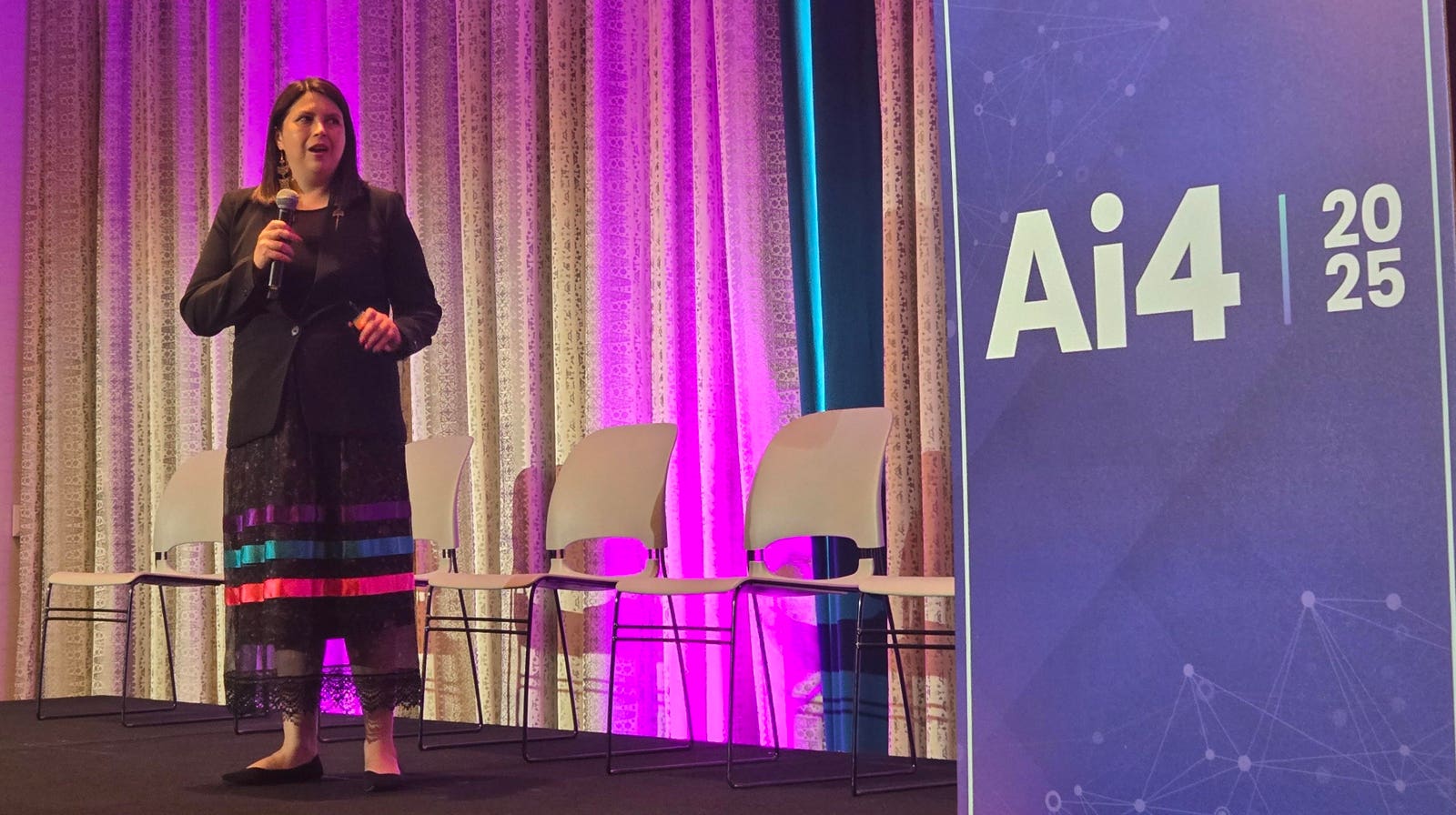Paula Starr, Chief Information Officer of the Cherokee Nation at the Ai4 2025 Conference
Ron Schmelzer
When most enterprises and governments evaluate artificial intelligence, their primary lens is return on investment such as how many processes can be automated, how many jobs restructured, and how much efficiency squeezed from the system. At the Ai4 2025 conference in Las Vegas, Paula Starr, Chief Information Officer of the Cherokee Nation, offers a very different perspective. For sovereign tribal governments like the Cherokee, ROI isn’t purely financial. It is cultural, legal, and existential.
“AI must serve the collective good and uphold Cherokee values,” Starr told the audience. “If a tool compromises that, it doesn’t belong in our Nation’s systems.”
This perspective positions the Cherokee Nation at the forefront of a movement redefining what artificial intelligence governance means. While big tech and large governments experiment with guardrails, the Cherokee Nation is constructing a model rooted in centuries of tradition and sovereignty.
From Enterprise ROI To Sovereign ROI
The Cherokee Nation, with nearly 480,000 citizens and a land base of 7,000 square miles in northeastern Oklahoma, has ambitions and obligations that extend far beyond typical government IT departments. The question of AI adoption is not simply “how much faster can a form be processed” or “what percentage of staff hours can be reduced.” It is about protecting Cherokee data sovereignty, ensuring cultural preservation, and reinforcing treaty rights in the digital era.
That shift in framing, away from efficiency and toward sovereignty, has profound implications for how AI is selected, tested, and deployed. In most enterprises, procurement is measured in business outcomes. For the Cherokee Nation, the baseline metric is trust. Citizen data must be treated with the same protection as physical sovereignty, and outcomes must strengthen rather than erode the community’s lifeways.
The concept of ROI here stretches to include aspects of citizen trust, cultural preservation, and legal autonomy. The key questions to address with AI include are citizens more confident engaging with tribal services, does AI strengthen traditions, language, or practices, and does technology reinforce tribal governance authority?
AI in Action: Use Cases Built on Values
Starr’s presentation outlined several initiatives now underway that showcase how AI can be deployed under this framework.
The Gadugi Portal, named after the Cherokee value of working together, is built on Salesforce and augmented with AI to provide authenticated access to tribal services. Rather than reducing headcount, the platform allows more citizens to be served without expanding staffing, improving efficiency while broadening reach across geography.
A Legal Agent developed in Microsoft Copilot Studio with assistance from MIT interns, consolidates treaty law, tribal codes, executive orders, and court rulings into a single AI-driven research system. For a sovereign government often required to defend its rights in state and federal courts, this capability accelerates legal decision-making and strengthens sovereignty.
The Cherokee.gov AI Agent, as part of a website refresh launching this year, includes an AI assistant that helps citizens navigate services and applications. The expected result is higher completion rates, 24/7 accessibility, and a reduction in friction for rural citizens.
In a unique blending of cultural continuity and conservation, the Nation is using AI-driven scanning to replicate turtle shells traditionally used in ceremonies, without harming wildlife by using 3D printed shells.
These examples underscore a central point. AI is not replacing people, it is extending tradition and sovereignty into the digital domain.
Governance: Policy Before Code
Many enterprises are only now realizing the importance of governance after experimentation with generative AI has already run ahead of regulation. The Cherokee Nation has taken the opposite approach.
In October 2024, Principal Chief Chuck Hoskin Jr. issued an Executive Order on Data Sovereignty and Self-Governance, creating the AI, Data Sovereignty, and Cybersecurity Task Force. Starr, as CIO, chaired this group, which produced a comprehensive roadmap earlier this year.
The report’s key recommendations included adoption of the NIST AI Risk Management Framework to provide a baseline for ethics, transparency, and accountability. Also recommended is the creation of dedicated AI and Data Governance Committees with clear roles for policy development, legal review, and risk mitigation. Other recommendations include institution of an AI Questionnaire for evaluating any generative AI tools under consideration, covering oversight, data privacy, bias mitigation, and risk scenarios.
The document also aims for standardization of the Cherokee Citizen ID across all data systems, strengthening both sovereignty and service delivery, expansion of data literacy programs for the workforce, ensuring adoption doesn’t outpace understanding, and establishment of a Tribal Innovation Summit to generate citizen-driven use cases.
Community Values as a Governance Lens
The framework is not just technical. It is cultural. Starr shared how Cherokee Community Values are core to the implementation and usage of AI. Principles such as “detsadasinasdi itsehesdi”, translated as live skillfully and resourcefully aims to engage with new technologies to augment talents and skills. “Detsadageyusesdi” which is to protect each other as a mother with child aims to protect the data of our citizens as we would protect their existence and “detsadanvwidisgesdi”, encourage and instruct one another in a gentle and thoughtful way is focused on meeting the challenges of the future and staying forever resilient.
When surveyed, while only 74% of Cherokee citizens said they had limited AI understanding, 70% were open to AI adoption if it was aligned with cultural and ethical standards. That conditional openness is the key, AI is welcome if it is accountable to values.
By embedding these cultural guardrails, the Nation ensures that AI outcomes are not only efficient but also consistent with the community’s identity. In effect, the Cherokee are demonstrating that governance frameworks grounded in culture may be more effective than those grounded solely in regulation.
Broader Context: A Global Movement
The Cherokee Nation is not alone in rethinking digital sovereignty. Around the world, Indigenous communities are building frameworks to ensure emerging technologies serve their people rather than exploit them.
In Canada, the Indigenous Digital Sovereignty Initiative seeks to give First Nations control over data infrastructure and governance. In New Zealand, the Māori Data Sovereignty Network asserts that data about Māori people should be subject to Māori governance.
The Cherokee approach, integrating AI into service delivery while grounding deployments in cultural values, adds a North American model to this growing international movement.
For governments worldwide struggling with questions of digital ethics, this experiment in sovereignty-driven AI governance may provide a reference point. Where corporations often prioritize shareholder returns, sovereign nations must prioritize the well-being of citizens and future generations.
As Starr put it plainly, “AI is a tool. But it’s our people, our values, and our policy that give it direction.”
That framing may turn out to be the most sustainable way to harness AI, because it ties innovation not just to speed and scale but to the long-term continuity of a people.









